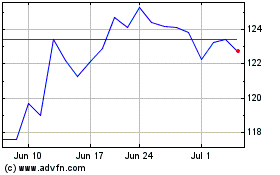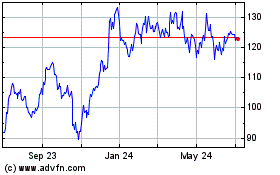Sam Zell: Global Woes Will Likely Push U.S. Into Recession
April 19 2016 - 12:20PM
Dow Jones News
Billionaire investor Sam Zell, who correctly called the top of
the last commercial real-estate cycle, is predicting global
problems will likely push the U.S. into a recession in the next
year.
While the U.S. is humming along fine at the moment, Mr. Zell
warned that it isn't immune to problems in the world economy. Those
problems include low oil prices, falling import demand from
emerging economies, volatile financial markets, deflation, possible
negative interest rates and currency exchange rate fluctuations, he
said.
"I'm not being pessimistic, I'm being realistic," he said last
week at a real-estate conference in New York. The U.S. economy is
now "in the ninth inning," he said.
In 2007, Mr. Zell famously sold his Equity Office Properties
Trust in a $39 billion deal just before the market crashed. He also
made a fortune buying discounted assets in the wake of the
recession of the early 1990s, a strategy that earned him the
sobriquet of the "grave dancer."
But other real-estate investors who also have amassed admirable
track records have a less dire outlook. "It's definitely too early
to call the end here," said Jonathan Gray, global head of real
estate at Blackstone Group, at the same real-estate conference.
"Growth will continue to be there—just not as strong as seen in the
past."
This isn't the first time Mr. Zell has talked about a recession.
In 2012, he warned that corporate enterprises were delaying
projects and other capital expenditures, indicating a lack of
confidence in the economy. He also said the government's
quantitative-easing economic stimulus program had created an excess
flow of capital, where too much capital was chasing after too few
opportunities.
"It's very hard not to assume that we're on the cusp of going
back into a recession," he said in a 2012 interview with CNBC.
Real-estate investors are more than ever polishing up their
crystal balls because commercial property values have been on a
mostly uninterrupted upward march since 2009. Over the past year,
concerns over when and how much the Federal Reserve will raise
interest rates have taken a toll on real-estate investment trust
prices.
"We're probably approaching a correction at some point, given
how long it's been going on, but the question is how deep will that
be," said Owen Thomas, chief executive of Boston Properties
Inc.
Some REIT chief executives said they are preparing for a
downturn—although many believe it is still on the distant
horizon.
"We've been deleveraging like most of our peers have, and
positioning ourselves so that when the recession hits, we have
capital to go out and acquire at good prices," said James Connor,
CEO of Duke Realty.
Mr. Connor said he expects a correction at some point, just not
likely in the next year. "We're about 30 months beyond the average
length of a recovery," he said. "Is it going to end tomorrow?
Probably not. But, I don't know if any of us are bullish about 2017
and 2018."
When the recession does hit, Mr. Zell believes it will be a
"significantly milder version" than the previous one. In the
real-estate world, he noted that companies have far less leverage
today than they did in 2007, which will make it easier for them to
weather through the downturn.
In recent months, Mr. Zell has been selling properties in his
Equity Residential and Equity Commonwealth portfolios. Over the
past 18 months, he sold $3.5 billion of Equity Commonwealth
properties, and, in January, he sold a 23,000-unit Equity
Residential portfolio for about $5.4 billion. Mr. Zell said the
Equity Residential portfolio sale was part of a restructuring aimed
at selling properties in suburban markets to focus solely on
densely populated ones.
As evidence of global economic problems, Mr. Zell noted that
Nigeria slashed its 2016 economic growth projection to 3.2% from
6.3% in 2015. "For an emerging market like that, it's a disaster,
and that's happening all over the world," he said. "So, I just
don't think the U.S. can avoid it."
The U.S. also is deeply "polarized," which led to the popularity
of Donald Trump. He sees Mr. Trump as an "enormous wild card" whose
leadership is "full of risk." All his campaign has said is 'it's
going to be great' and to 'trust me,' said Mr. Zell.
"If somebody needs a bell ringing to figure out that the
real-estate market is pretty frothy right now, then I'm in the
business of selling hearing aids," he said.
(END) Dow Jones Newswires
April 19, 2016 12:05 ET (16:05 GMT)
Copyright (c) 2016 Dow Jones & Company, Inc.
Blackstone (NYSE:BX)
Historical Stock Chart
From Mar 2024 to Apr 2024

Blackstone (NYSE:BX)
Historical Stock Chart
From Apr 2023 to Apr 2024
